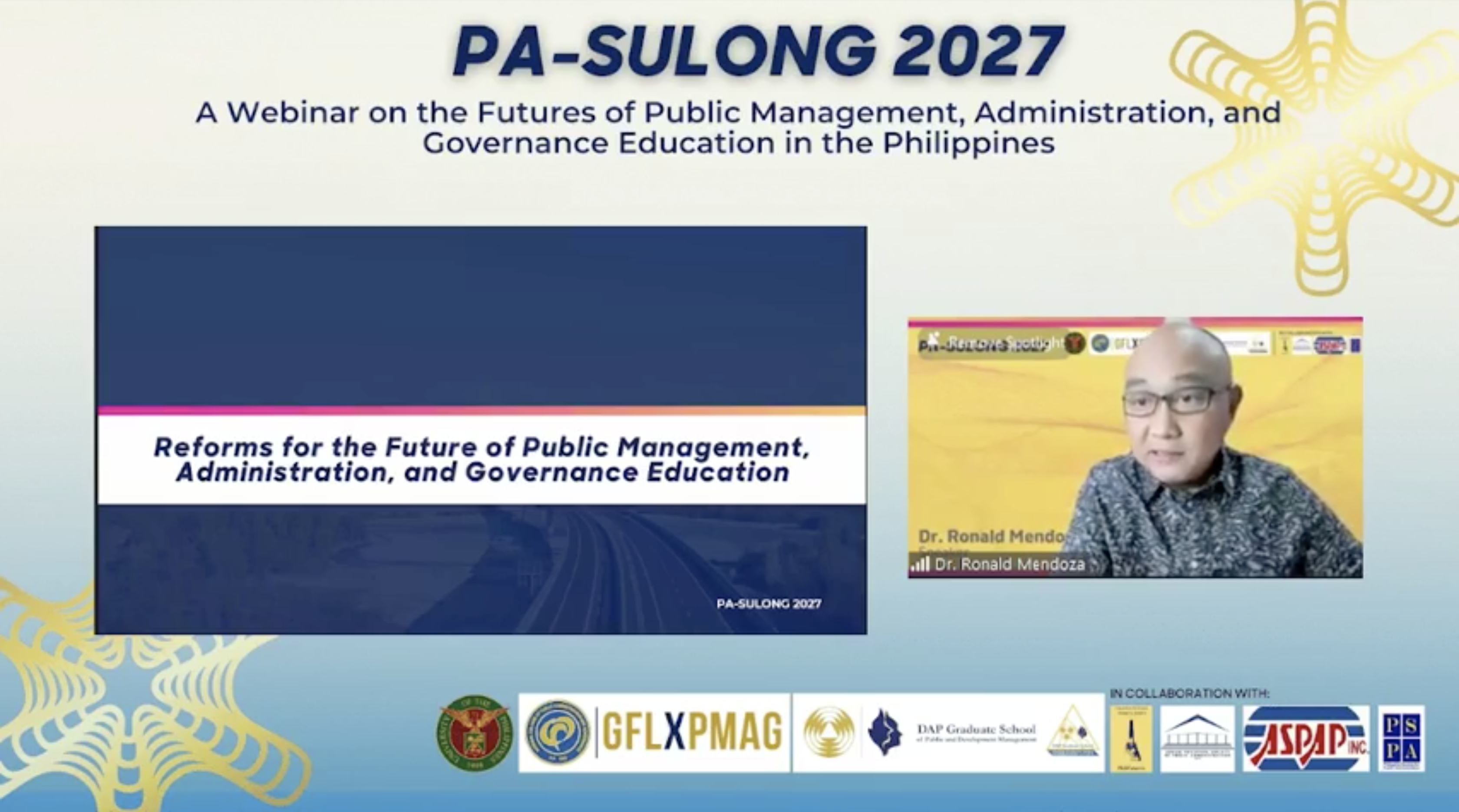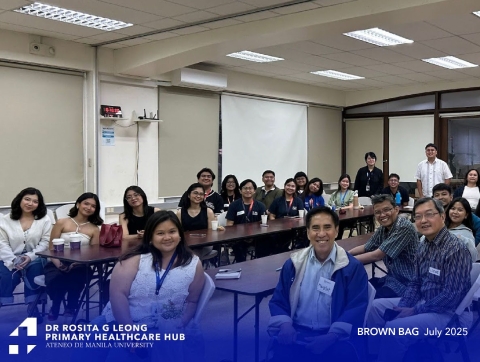ASOG Dean Ronald Mendoza delivers plenary lecture in NCPAG Governance Futures Lab webinar
06 May 2022
ASOG Dean Ronald U Mendoza, PhD, joined the Deans and heads of the country's top schools of public policy, public administration and government in a discussion on futures thinking and foresight in teaching, research, training and development, and community service initiatives and programs for schools of government in the Philippines on 29 April 2022.

Organized by the NCPAG Governance Futures Lab (GFL), the webinar on the "Futures of Public Management, Administration, and Governance (PMAG) Education in the Philippines" was attended by almost 500 students, faculty and guests. To watch the webinar on Facebook, please click this link. Dean Mendoza’s lecture begins at 1:02:32.
Here’s a transcript of Dean Mendoza's plenary lecture on “Reforms for the Future of Public Management, Administration, and Governance Education.”
----------------------------
Reforms for the future of public management and governance education
Ronald U. Mendoza, PhD
Dean and Professor, Ateneo de Manila University – School of Government
E-mail: rumendoza@ateneo.edu
Presentation at the “PA-Sulong 2027: A Webinar on the Futures of Public Management, Administration, and Governance Education in the Philippines” organized by UP NCPAG, UP NCPAG Governance Futures Lab, and DAP Graduate School of Public and Development Management - Futures Studies Platform, in collaboration with the Philippine Futures Thinking Society, the Philippine Society for Public Administration, the Association of Schools of Public Administration in the Philippines, Inc., and the Junior Philippine Society for Public Administration, UP NCPAG, 29 April 2022
----------------------------
It is a pleasure for me to join you today for this discussion on the future of public management, public administration and governance education. This is a very timely discussion as public policymaking and management today appears beset by many “wicked problems”. Clearly, our schools of public policy need to evolve with the times in order to remain relevant. As educators, we have the responsibility to try to see beyond the immediate and pressing issues, and to try to map out the welfare enhancing reforms that could be pursued; and the management skills and leadership traits that should be in place to realize more effective collective action to attain those goals. Some of the main challenges for public policymakers include the following.
1. Coronavirus pandemic remains a real risk across and within borders as nations attempt to recover from the economic and health crises of 2020 to 2022. From the identification of the virus in December 2019, to its full genetic mapping by early 2020 (1), and the eventual creation of vaccines later in December that same year, the response of the world’s scientific community represents a feat of cooperation, sharing data and research findings in the race to find a cure (2). However, these vaccines, once created, were snapped up predominantly by richer nations, and international inequality in vaccine access was mirrored in vaccine inequality within many countries. In the Philippines for example, according to the Department of Health website, by 18 April 2022 the National Capital Region reached 98% of its vaccination target while the Bangsamoro Autonomous Region of Muslim Mindanao (BARMM) only managed 16% of the target population for complete doses, and a mere 3% of the target population for booster shots. This uneven and unequal vaccination roll out threatens to further exacerbate the unequalizing effects of the pandemic.
2. Populism is the “other contagion” sweeping across countries spreading across developed and developing democracies worldwide in the last decade or so, with deep implications on social cohesion, democratic political institutions and countries’ abilities for collective action. One of the main casualties in a populist era is the middle ground. We are not just disagreeing on policies at this point, but also on facts (e.g. history), and even more deeply, on values (e.g. corruption, vote buying, cronyism, etc). Widely understood facts and shared values are two ingredients for finding common ground, and both appear to be severely eroded under a populist wave.
3. Climate change is another wicked problem that poses growing risks particularly for countries like the Philippines which may be severely affected by sea level rise as well as the vicissitudes of the weather, producing extreme weather events, droughts, flood-creating rains and powerful typhoons. Based on a study by the Coastal Sea Level Rise Philippines Project (CSLR-Phil), in the Manila Bay area, the sea level is rising by an estimated 12.13 mm per year, or four times faster than the global average (3). And due to existing inequality in urban development, sea level rise, extreme weather events and the general effects of climate change are likely to impact the poor much more than the rich.
4. “Fake news” is often used as shorthand for the misinformation, disinformation and malinformation now prevalent in social media. In 2018, Facebook executive Katie Harbath called the Philippines “patient zero” in what many would later consider a fake news pandemic or “infodemic” across social media in a growing number of democracies. At the Ateneo Policy Center in Manila, researchers have developed a potential diagnostic tool to measure the presence and depth of fake news vulnerability, particularly among the young (aged 18-29), expected to account for 24 million voters in the Philippines’ May 2022 elections. Of around 24,625 young Filipinos who participated, only about 7% accurately spotted which news was real or fake on all 10 examples. Meanwhile, about 6,376 or 26% of the students scored 50% and below, suggesting they were better off flipping a coin rather than attempting to spot fake news (4).
5. Conflict risks on both global and regional scales continue to threaten many countries. In the Philippines, the threat of terrorism was exposed by the Marawi siege incident, a 5-month long battle in around mid-2017 between terrorists and government forces that left most of Marawi City in ruins. In recent months, the Russian invasion of Ukraine has once again exposed the interconnectedness of many nations today, as this conflict has created aftershocks threatening to unhinge global economic recovery from the pandemic.
Clearly, no single academic discipline will be sufficient to even begin to tackle these wicked problems. It has been fashionable to brandish “whole of government” rhetoric on official responses to many of these pressing challenges. The reality, of course, is that government is often just as fractured as the society it hopes to serve (or in some cases, fails to serve). In order to respond more effectively to these various challenges and more, there needs to be a dramatic improvement in leadership and management skills, drawing in particular on capabilities that center on the following key areas.
First, effective public policy communications, underpinned by strong information management and evidence-informed and technology-equipped strategies to deploy facts and evidence and counteract fake news will be necessary our information and disinformation rich policy environment today. Here, a deep understanding of both citizens’ cognition and emotions will necessary and there is a deep and developing science behind greater effectiveness in this area.
Adeptness in managing multidisciplinary policymaking and administration will also be key to better realize the so-called whole of government approaches necessary for effective collection action. Strong collaboration among experts across different fields should be commonplace. Dr Ricardo Hausmann of Harvard Kennedy School calls for schools of public policy to serve as laboratories for practical multi-disciplinary policy scholarship. He said don’t blame economics, blame public policy when things go wrong. He is right. Public policy is too important to leave to the economists only, or the lawyers only, or the doctors only, or the military only. Public policy should be multi-disciplinary and integrative in its approach to solving society’s main challenges (5).
This then emphasizes the important role of evidence-based policymaking. An abiding adherence to evidence-based policymaking and public administration will be key not just to guide effectiveness, but in many cases to bridge divides in society and also to speak truth to power. Often an anti-intellectualism bias is creeping into many policy spheres as single-minded advocates capture the limelight, while carefully framed and evidence-informed scholars and analysts offer long-winded explanations that often don’t seem to fit well in soundbytes. Yet, under a populist landscape, advancing evidence and speaking truth to power is more important than ever.
Finally, we in Ateneo believe that a deep ethics and an understanding of servant leadership will be necessary to facilitate effective collective action particularly in highly unequal and deeply divided societies such as in the Philippines. The international literature finds that inequality and/or the lack of social mobility (with all its attendant ills) breed populism and the many adverse side-effects on governance that erode trust in the public sector and perceptions of fairness in society. (6) Ethics in policymaking and implementation is something we can strengthen not simply to protect those who could be harmed by policy actions (or inaction as the case may be); but also to help revive stronger trust in the public sector and resuscitate social cohesion and subsequent collective action.
Re-instilling strong ethics and servant leadership in the Philippine public sector will likely hinge on a number of reforms, but most impactful of which would be to liberalize our political system from the grip of political clans. If are able to level the playing field by regulating political dynasties, then more alternative leaders may yet serve this country, prompting better governance through the enhanced competition that they represent, and through the reform orientation that only those without conflict of interest with the status quo can truly bring to the table.
Permit me to conclude on a personal note. I end my Deanship in Ateneo School of Government in 30 days. I began on 1 June 2016—same time as President Duterte’s administration. If many challenges to our democracy and governance as well as threats to our institutions help emphasize the importance of an independent institutions that can speak truth to power, then I must be thankful for the last 6 years as they made my job challenging; but they also made much clearer our mission, as the largest private-sector-run school of government in the Philippines.
As a Jesuit institution, ASOG’s role in producing servant leaders is clear and now reflects our strategic academic and research thrusts in national security, strategic communications, anti-corruption, leadership and governance.
And for all of us educators in public policy and governance, I see our main duty to help propagate strong ambitions for progress and nation-building reforms to the next generation of public sector managers, reformists and leaders. To remind them that our profession is in the end a vocation, to try and understand the common good, to try and motivate our citizens towards it, and to act in humility that as reformists, managers and leaders in the public sector, we all have a small and temporary role to play in this grand nation-building endeavor.
So I end with a message to my students in ASOG, now addressing this also to all the students in our sister school, UP NCPAG: Be the better leaders our country needs.
Salamat po.
----------------------------




